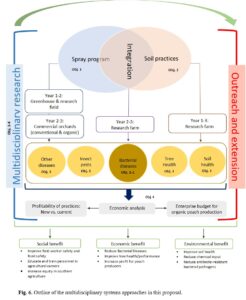Project Overview
Information Products
Commodities
- Fruits: peaches
Practices
- Crop Production: crop improvement and selection
- Pest Management: integrated pest management
Proposal abstract:
The Southeastern U.S. is the second largest peach producing region in the country. However, producing peaches in the southeast is challenging due to the climate favorable for pest and disease development. In addition, orchard soils have low soil organic carbon content, meager soil fertility, and poor soil structure, which inflicts tree stress that negatively impacts pest and disease tolerance and may lead to reduced yields. Current commercial practices do little to improve the soils.
Bacterial diseases intensify from both the favorable climate and stress-induced predisposition to infection. Bacterial spot (caused by Xanthomonas arboricola pv. pruni) and bacterial canker (caused by Pseudomonas syringae pv. syringae) are the two most important bacterial diseases of peach and cause significant direct annual losses - up to $22 million in South Carolina and Georgia alone (estimates from SC/GA Peach Councils). Bacterial spots on peach leaves could lead to severe defoliation, and spots on fruit significantly reduce the marketable yield. Bacterial canker on woody tissues leads to shoot death and tree death. Managing these two diseases is very challenging. There are no cultivars with absolute resistance to either of the two diseases; only a few cultivars are tolerant to bacterial spot and no cultivar has tolerance to bacterial canker. Currently, no chemical control options are available for bacterial canker, and bacterial spot management mainly relies on weekly sprays of copper and antibiotics during the growing season. These chemicals could negatively impact the environment and have led to emergence of copper-tolerant and antibiotic-resistant pathogens, as recently found in SC, indicating an even greater need for new management options.
Our goal is to improve sustainability of the southeastern peach production systems by developing holistic strategies to improve disease management and tree health. In collaboration with peach producers, a multi-disciplinary team of plant pathologists, horticulturist, soil biogeochemist, economist, and entomologist will conduct systems research to: 1) develop sustainable tree spray programs with biopesticides to reduce bacterial diseases; 2) assess sustainable soil management practices and their integration with spray programs on reducing bacterial diseases; 3) evaluate the spray programs and soil practices and their integration on tree health/performance, soil health, and management of other diseases and pests; and 4) evaluate the profitability of the new spray programs and soil practices and develop an enterprise budget for organic peach production. We will conduct outreach activities to assist peach producers with the adoption of new spray programs and soil practices, to disseminate our results to the scientific community, and to increase equity of underserved producers in the southeast. The newly developed spray programs and soil management practices are expected to reduce losses from bacterial diseases while improving tree health/performance [improved drought tolerance (due to enhanced soil water holding capacity), nutrient cycling, and management of other diseases and pests] with less chemical and water inputs, and increasing profits for producers. We expect our findings to benefit the entire production system of peach as well as other stone fruits affected by the same diseases, and to contribute to the long-range improvement of U.S. agriculture.
Project objectives from proposal:
The PIs have been working very closely with the peach producers and Extension agents in South Carolina, the largest peach producing state in the south and the second largest in the nation. In the past few years, the PIs of this proposal received numerous calls from peach producers and Extension agents about the severity of bacterial diseases on their farms. The PIs visited producers throughout the state at their farms, discussed their concerns and research needs, and met with them again at the 2020 and 2021 peach production meetings in Edgefield, South Carolina (virtual on 2021) to determine the objectives of this proposal.
- Develop sustainable spray programs with biopesticides to reduce bacterial diseases;
- Evaluate biopesticides on bacterial disease development in greenhouse and research field;
- Evaluate biopesticides on bacterial disease development in both conventional and organic peach orchards;
- Assess sustainable soil management practices and their integration with spray programs on reducing bacterial diseases in research orchards;
- Evaluate the impact of various soil management practices on bacterial disease development;
- Evaluate the integrated impact of soil practices and spray programs on bacterial disease development;
- Evaluate the independent spray programs and soil practices and their integration on tree health/performance, soil health, and management of other diseases and pests;
- Evaluate spray programs alone;
- Evaluate soil practices alone;
- Evaluate the integration of spray programs and soil practices;
- Evaluate the profitability of the new spray programs and soil practices and develop an enterprise budget for organic peach production;
- Compare the profitability of the new spray programs and soil practices with conventional and organic growers’ standard programs;
- Develop the first enterprise budget for organic peach production.
